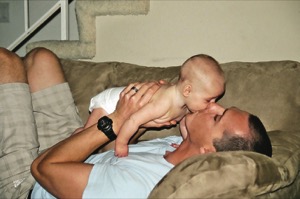
Meet Hillary Whittington, the author of ‘Raising Ryland’ – the remarkable story of the transition of her son
May 22, 2014 the San Diego LGBT community were introduced to little Ryland Whittington. The sixth annual Harvey Milk Breakfast audience hushed as Jeff and Hillary Whittington presented a video of the background and transition of their son Ryland. The emotion that was felt in the large ballroom of the Bayfront Hilton that bright San Diego morning has since been replicated across the country and the world as the video went viral and has been seen by more than seven million viewers since its posting.
When San Diegans Hillary and Jeff Whittington posted the YouTube video chronicling their five-year-old son Ryland’s transition from girl to boy, they had no idea the interest that it would generate.
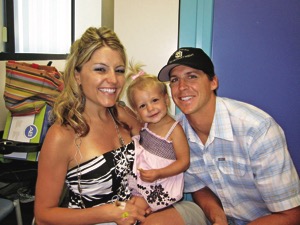
After they discovered their daughter Ryland was deaf at age one and needed cochlear implants, the Whittingtons spent nearly four years successfully teaching Ryland to speak. But once Ryland gained the power of speech, an amazing thing happened. Ryland kept insisting, “I am a boy!” After learning that 41 percent of people who identify as transgender attempt to take their own lives, Hillary and Jeff decided to listen to Ryland and made it their mission to support their child – no matter what.
In February their book, RAISING RYLAND: Our Story of Parenting a Transgender Child with No Strings Attached was published by William Morrow. Authored by Hillary Whittington it is a full, emotional and moving account of their journey with their amazing child. Following the book launch I had the opportunity to talk with Hillary Whittington about this powerful story of acceptance and unconditional love.
Steve Lee: Hillary, thank you so much for talking with me. I was in the audience at that Harvey Milk Breakfast back in May 2014 when you presented your video on Ryland. It was an exceptional moment. Did you expect the reaction you got following the release of that video?
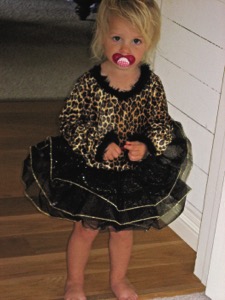
Hillary Whittington: Thank you so much for your kind words, Steve. We actually made the video a year prior to the Harvey Milk event, and we were very protective of it. When we first used it to educate the school staff, the reactions we received gave us indications it had the potential to peak a lot of interest. Our fear was that if it got out, it would go viral and we could never get it back, but we never realized it would gain over 7 million views and get the attention it eventually received! We were a bit overwhelmed with the response around the globe.
In “Raising Ryland”, as Ryland is being wheeled into the operating room for cochlear implants, you describe passing the Pediatric Oncology Unit which prompted you to say, “… this could be so much worse.” Tell me about that moment and did all the issues with Ryland’s deafness better prepare you for what was to come?
I think it is normal for parents to grieve when they first learn their child may face any extra life challenges. Initially, we were devastated to learn Ryland was deaf, but when we stepped back and realized Ryland’s deaf diagnosis was not a matter of life-and-death, it put everything into perspective. We could still hold our child in our arms, love him and give him the best life possible. I sometimes say Ryland’s deaf diagnosis gave me a “warm-up” for the next hurdle. It made our skin a little thicker, and prepped us for the next challenge.
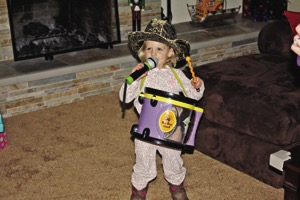
With “Raising Ryland” you really do take the reader behind the scenes to experience what your family was going through. Many would have interpreted Ryland’s insistence as being a boy as a “phase a child grows out of.” What convinced you and Jeff that this was different. What made you guys really “listen” to Ryland?
When Ryland began showing signs of pain and shame from being seen as a girl, it became clearer to me he wasn’t just being a defiant child or going through a phase. From the very beginning, Ryland has aimed to please us, and he would eventually “cave in” to my insistence of bows and “girl” outfits, but his resistance became stronger with each passing day. The stronger and more insistent he became, the more I realized that this wasn’t a phase. The eventual comments of, “When the family dies, I will cut my hair so I can be a boy,” and “Why did God make me this way?” were the final push to exploring the reasons behind why Ryland felt the way he did.
What was the reaction of your immediate family and friends to your decision in supporting Ryland in his transition?
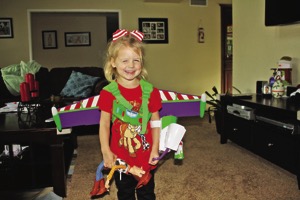
Most of our family and friends were initially shocked when I first began explaining what I thought was going on. Some of those close to us began researching and reading recommended books, while some questioned us continuously and some avoided talking about it altogether. Once our friends and family saw Ryland’s happiness growing, they jumped on board with our decision to change pronouns and see Ryland as a boy.
You used a letter to tell a wider audience about Ryland’s transition. What prompted you to take this course and looking back would you have changed anything?
We created a letter and handed it out to close friends and family with the intention of answering the many questions that could arise, before they had a chance to be asked. The letter also helped us from having to answer the same questions over and over again. This was three years ago, and there was muchless media and talk about being transgender. I wish I would have made the video earlier because it seemed to have a bigger impact on skeptics, but the letter was also a strong way to get the message out there.
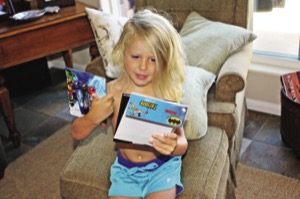
You describe the considerable strain transitioning Ryland at such a young age put on your relationship with Jeff and your close family. What was the key to keeping that all together?
All of our family dealt with Ryland’s transition differently, and we all grieved in different ways. Jeff and I certainly dealt with Ryland’s transition in our own ways. There were so many times Jeff and I didn’t see eye-to-eye and there were many moments of wanting to “give up.” We love our children so much, and I think that deep down, we were both just very scared. We had so much inner turmoil for the unknown future ahead, and we took it out on each other. At the end of the day, both of us wanted what was best for Ryland and Brynley and I think this is what held us together. No one will love our children as much as we do, and we strive to maintain a stable home where our children feel heard and loved.
Throughout the book Ryland comes across as resilient and remarkably calm; calmer, in fact, than anyone else. Why do you think that was and did this make transitioning easier?
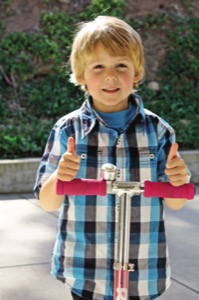
Ryland is a very intelligent, insightful child. Part of me believes his deafness transformed him into the perceptive person he is today. I have to also attribute some of his calmness to his inner confidence and sense of self. Transitioning Ryland was definitely easier because he learned to be patient and understanding, and was bright enough to understand this wasn’t common or easy. We were all learning what to do. He remained grateful for our efforts to treat him as our son and continues to have much forgiveness for others who do not understand.
Ryland seemed to adjust to his “celebrity” status with a maturity well beyond his years. Did that surprise you and are you happy to now tone that down?
Ryland understands there are many children in the world who are not accepted by their family, and he knows that his story was seen by many and perhaps offered a group of children a more promising future. I am not at all surprised by how Ryland has handled himself throughout this process, though we remain committed to making his day-to-day life as typical as possible. I hope he will always remain humble and grateful for this opportunity to help others and we will continue to follow his lead when it comes to being public about his journey.
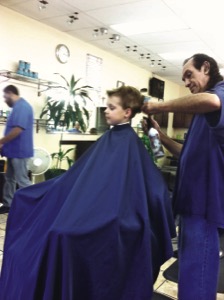
Clearly there will be many challenges in the future, particularly with the onset of puberty. Have you thought about how you will face that and will you continue to document Ryland’s progress for perhaps a follow-up book?
Puberty is a difficult time for all children, and even more so for children like Ryland. If Ryland continues to present the same in the next couple of years, he will receive hormone blockers, which are harmless and completely reversible. Hormone blockers will “buy us time” as Ryland matures, and if he still feels the same way in his teenage years, we will allow him to receive cross hormones so he can develop like his male peers. I can definitely see a follow-up book in the near future, but also want to make sure I keep my family as my primary focus.
Looking back would you have done anything different?
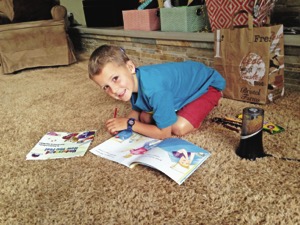
If I could take one thing back, I wish I hadn’t forced Ryland to wear feminine clothes and bows in his hair for so many years. I knew deep down how much he despised them, but I did it because I was uncomfortable when others thought Ryland was a boy. I wish I had known more about gender before becoming a mother, and it would have been nice if I had dressed Ryland in gender-neutral clothes as an infant, so I have more photos to display now. I feel like I have had to hide or erase many memories from our past because I wanted him to appear “cute” to others.
Toward the end of the book you come to the realization that you “… have to stop ‘scuttling’ in hurried shame … and have to start walking the walk … to come out.” Can you describe that pivotal moment?
It has been challenging to remain strong in the face of criticism, but if I want Ryland to be courageous and proud, then I must lead by example. The more I learn about the atrocities many transgender people face, the more confident I become in my message and purpose. I cannot sit back and wait for someone else to change our world. If I am able to help one family gain hope, or gain one unlikely person’s support, then my purpose is complete.
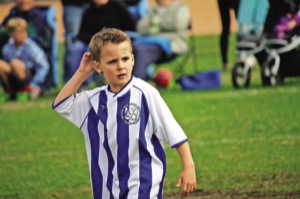
Finally, what would you say to parents facing a similar situation?
I would start by reading and researching as much as possible. Gender is a spectrum and sometimes children don’t fit perfectly into the male “box” or female “box.” Find other families on this journey or support groups where you can gather information and find the best resources in your area. Try to set expectations and boundaries with friends and family, and support your child as best you can. Above all else, love your child unconditionally and let them know you will support them no matter what.
Hillary, thank you so much for talking to me. We wish you, Jeff, Ryland and Brynley all the best in the future.
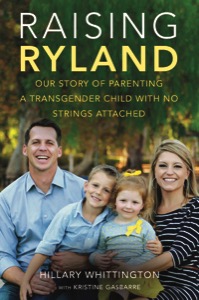
Thank you so much, Steve! We appreciate the opportunity to speak with you and San Diego LGBT Weekly! All our best, Hillary.
RAISING RYLAND: Our Story of Parenting a Transgender Child with No Strings Attached
by Hillary Whittington
Published by William Morrow
Available at Amazon, Barnes and Noble and other good bookstores
The Whittington Family: Ryland’s Story:











